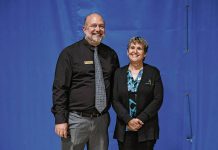The Cummins Foundation’s next chief executive officer will assume responsibility of overseeing and funding company projects worldwide aimed at improving the communities in which Cummins Inc. conducts business. That’s just the type of opportunity Mary Titsworth Chandler wanted when she joined the company.
Chandler spent the first part of her career as an attorney in Indianapolis, but left the profession in 2003 to care for her children. In 2011, after earning a Master of Business Administration degree, Chandler said she sought a job with Cummins’ Corporate Responsibility Team because she wanted to do community work.
“I was committed to working the second half of my career on issues that improve communities,” said Chandler, 54.
She said the company’s values were similar to those instilled in her by her parents — education and providing access to opportunities for women and the disadvantaged.
[sc:text-divider text-divider-title=”Story continues below gallery” ]
Family conversations about these types of topics were regular and made a deep impression. Her father, Tom Titsworth, grew up in Rushville in the 1940s and ’50s, and had a black high school friend who was not allowed to sit on the first floor of the local movie theater. So her father sat up in the balcony with his friend, she said.
“It formed the basis of interest in my community work,” Chandler said of family discussions about values.
She will continue her passion as The Cummins’ Foundation’s leader and executive director of corporate responsibility Dec. 1, when she takes over for Mark Levett, who is retiring.
Ready to lead
The roles carry great responsibility. The foundation supports projects in which its nearly 55,000 employees are engaged. Cummins invested $18.1 million in corporate responsibility efforts last year, and $15.3 million in 2013, company spokesman Jon Mills said.Levett said Chandler is up to the challenge.“Mary is very bright, very strategic, wonderful at creating programs that impact and has a great heart … She’ll just take corporate responsibility to the next level at Cummins,” Levett said.
“She’ll implement a lot of things that we’ve started, but she’ll find a way to make them better. She’ll definitely improve our overall strategy, but she will do a great job of implementing things around the world. And she’ll be visible in a few key organizations in Columbus.”
Chandler has been groomed for her new positions for the past 18 months, taking on greater responsibilities to gain experience, Levett said.
She created and implemented Technical Education for Communities, the only global program Cummins has, Levett said. The program teaches technical vocational education in Cummins’ global communities. Cummins has 11 TEC schools established around the world and eight more are planned for next year, Levett said.
C
ommunity improvementThe Cummins Foundation has had significant impact globally and locally. The company’s corporate responsibility team in India partnered with the local government, an area nonprofit organization, a group of trash collectors and more than 14,000 homes to recycle waste — 2.5 tons per day — and use the methane gas to produce electricity for street lights.Columbus nonprofit Sans Souci, which sells everything from discounted furniture to clothing, received a $20,000 Cummins Foundation grant in 2011 for warehouse improvements. That allowed Sans Souci to buy mobile bins that allowed donated items to be moved easily, which aided sorting, said Sheryl Adams, Sans Souci’s executive director. Industrial-strength shelving also was purchased.
Just as valuable as the grant, Adams said, was the connection of Cummins employees with Sans Souci. Subsequently, employees have aided the nonprofit with a rebranding campaign, a furniture drive and a clothing recycling program, among other projects.
Adams said her group could not have done those things on their own.
“It’s not about money, it’s their expertise,” she said.
The Cummins Foundation has played an ongoing role in education in Columbus since the late 1950s, paying the architectural design fees for some new schools. More recently, it supported creation of the Busy Bees Academy for early childhood learning, and the iGrad program to help at-risk high school students get on track to graduate.
“It’s been a strong partnership, and we have seemed to have a shared vision about community development,” Bartholomew Consolidated School Corp. Superintendent John Quick said.
The Cummins Foundation also gave a $19,000, two-year matching grant to the Bartholomew County School Supply Assistance Program. It was used to purchase 2,000 backpacks filled with school supplies for children of families who otherwise couldn’t afford the cost.
“They really do a lot and it’s been much appreciated,” said Diane Doup, a committee member with the school supply assistance program.
Clear vision
Chandler said she wants Cummins to have a greater impact on its communities.“My vision is to build on the work of Mark Levett and … to link all our programs to create better outcomes for people around the world. Without education there’s not the opportunity for jobs and improved lives,” she said.Chandler said she wants Cummins’ teams to increase their focus on evidence-based programs that create pathways out of poverty and into the middle class for people living in the company’s global communities. That involves examining what works and the fundamental predictors of economic success for children and youth from less-advantaged backgrounds.
Those predictors, she said, likely include:
Being born into a non-poor, two-parent family.
Being school-ready by the start of kindergarten.
Acquiring certain academic and social skills by about grade 6.
Graduating from high school/secondary school with decent grades and avoiding risky behavior.
Obtaining post-secondary education before age 30.
“These are not uniform predictors across all global economies certainly, but among many countries and cultures we likely can identify the most successful programs and interventions along the basic stages of a life cycle: family formation, early childhood, middle childhood, adolescence, transition to adulthood and adulthood. We will work within our three priority areas of education, environment and social justice/equality of opportunity to achieve our vision and goals,” Chandler said.
Her goals are big, but so is her enthusiasm for them.
“I come to work every day feeling terrific about what this company wants me to do,” Chandler said.
[sc:pullout-title pullout-title=”About the foundation” ][sc:pullout-text-begin]
Who: The Cummins Foundation
What: Part of the global giving arm of Cummins Inc.
How: Makes grants primarily in Cummins’ communities around the world and for projects that engage Cummins employees.
Types of grants given:
- Matching: Cummins employees’ charitable contributions are matched by The Cummins Foundation through the North American United Way campaign and company-established global matching programs.
- Community development: For qualified community partners to make an impact in the communities where Cummins does business.
- Incubator: Provides start-up funds for projects in energy efficiency and water conservation, protection and access. Designed to support employee projects that use technology and technical skills to solve environmental problems in Cummins communities.
- Architecture: For Bartholomew County, to help create a vibrant and economically viable community. Foundation recommends architects and provides funds for the design portion of architect fees for selected projects.
Founded: 1954, with mandate to affirm and promote humane living.
Headquarters: Columbus
— Source: cummins.com
[sc:pullout-text-end][sc:pullout-title pullout-title=”The Chandler file” ][sc:pullout-text-begin]
Who: Mary Titsworth Chandler
What: Next chief executive officer of The Cummins Foundation, and executive director of corporate responsibility
Background: Attorney, partner at Indianapolis law firm Wooden & McLaughlin; joined Cummins’ Corporate Responsibility team in 2011
Education: Bachelor’s degree in English from Miami University; law degree from Indiana University School of Law; Master of Business Administration from the University of Chicago Booth School of Business
Age: 54
Family: Husband, Bryan; children, Clare (17), Lee (16), Beck (12)
[sc:pullout-text-end]




